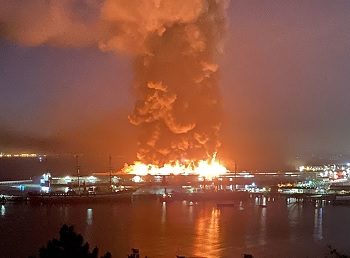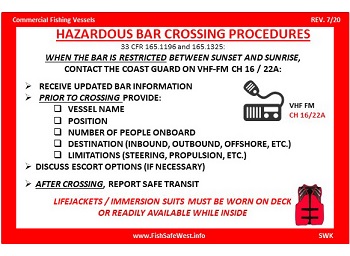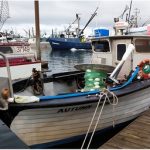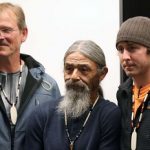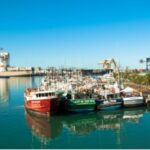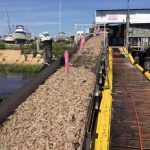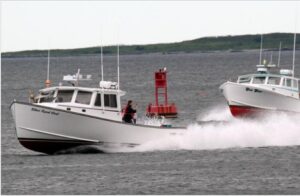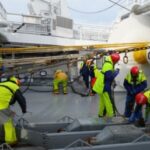The pre-dawn blaze in May devastated an 85,000-square-foot warehouse at the end of Pier 45 in Fisherman’s Wharf. Fishers, who lease space from the port to store their equipment, say the port knew but did not stop homeless people from entering and setting camping and cooking fires within the building, which contained flammable materials and lacked automatic sprinklers and fire extinguishers. Many businesses were forced to acquire new gear for this month’s Dungeness crab season while some remain shut out altogether, they say. >click to read< 08:31
Category Archives: Pacific

Report on Fishery Failures: Urgently Needed Disaster Declarations Act, S. 2346
Purpose of the Bill: The purpose of S. 2346, the Fishery Failures: Urgently Needed Disaster Declarations Act, is to clarify and expedite the disaster declaration process, establish certain deadlines for the National Oceanic and Atmospheric Administration (NOAA), reduce delays, and clarify eligibility for assistance to ensure that charter, recreational, and Tribal fishers have access to disaster funds. Additionally, the bill would provide employment opportunities for fishery employees displaced by a fishery disaster by prioritizing their hiring to undertake restoration, conservation, and other fishery rebuilding activities funded by disaster relief funds. >click to read< 09:22
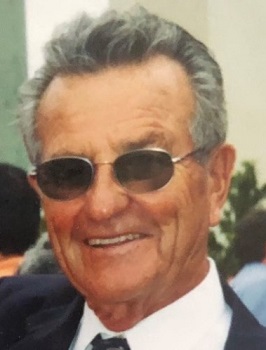
Joseph Anthony Gann of San Diego has passed away
Joseph was born in the fishing port of Gloucester, Massachusetts, on December 19, 1925. He then moved to San Diego in 1926 at the age of one, with his parents Vincent and Nazare, and his two brothers Vincent and Edmond. Joe’s sister Lillian was born a few years later. His father built and operated a commercial fishing clipper.,, Joe then entered the fishing business with his brother Edmond and formed their company Caribbean Marine Service Co. Inc.; they soon became successful tuna-fishing fleet owners.,,, Joe went to congress to fight the 200-mile limit, and then in the 1970’s, along with Julius Zolezzi, he went to Samoa to facilitate the Fishing Treaty between the United States and Samoa. >click to read< 13:44
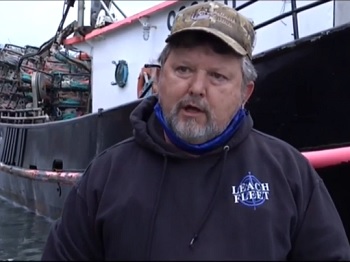
Price Negotiation Delayed! Will there be Oregon Dungeness crab for Christmas? Fleet still in port
Commercial Dungeness crab season, Oregon’s most valuable fishery, opened Wednesday. But crab boats remain tied up on docks in Coos Bay. “We’re kind of sitting here with our hands tied behind our back. We’ve got really no options,” Rex Leach, owner of the fishing vessel, Ms. Julie, said this week. While weather can be a hold-up, that’s not the case right now. Fishermen are stalled because of price negotiations with processing plants. video, >click to read< 18:15
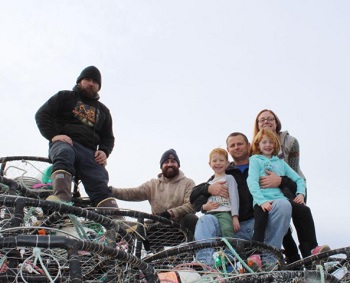
Crescent City Harbor: Crabbing as a family
After the state of California announced crab season would not open until Dec. 23, most of the owners and crews headed home to wait another week. The only boat with activity was the F/V Resolution, where boat owner Richard Nehmer and his crew made some final preparations. Nehmer also took the extra time to work with greenhorn Blake Mihelich, who is going crabbing for the first time. Nehmer was joined on the boat by his wife, Annie, and their children, Alana and Connor. “My grandfather was a fisherman, my father was a fisherman,” Richard said. “Connor will be a fourth-generation fisherman. Connor literally fishes with us. It’s his business, he just has to wait a few years.” photos >click to read< 09:18
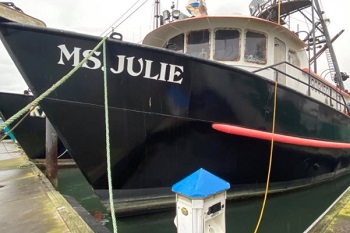
Oregon: Commercial Dungeness crab season not starting as fishermen hoped
Wednesday signifies the official start of the commercial Dungeness crab season, but it’s not starting out the way fishermen had hoped. This is the day they would normally be pulling crab pots out of the water and getting crab to the processors. But the boats are all still tied to the docks. That’s because market prices are still in question. Two processors have put an offer on the table of $2.50/pound, but Pacific,,, >click to read< 20:39
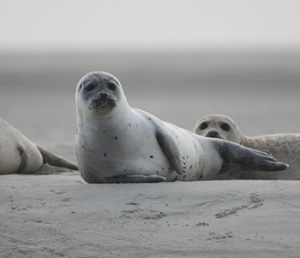
Harbour seals prime suspect in decline of steelhead populations in Thompson watershed
Rob Bison, a fish stock biologist, gave a live-streamed presentation on factors that could be contributing to the steelhead’s decline,,, The fish populations in the two rivers have been declining over the last 30-40 years, but it’s likely not their stream habitats that have led to the decline, he said. The drastic decline in steelhead appears to happen when the fish reach inshore waters and are eaten by harbour seals,,, Bison estimated that by reducing seal populations, steelhead populations could increase by 486%. >click to read< 13:03

California Dungeness Crab season opens Dec. 23
The official opening date of Nov. 15 had been delayed for weeks in the central California zone, from the Sonoma/Mendocino county line south, because of the possibility of migrating whales getting tangled in fishing lines. And it had been delayed in the northern zone, which consists of Humboldt, Mendocino and Del Norte counties, because the sample catch failed to reach the poundage required for testing.,, Since 2015, there have been delays in all but one commercial Dungeness season. A toxin, domoic acid, that could sicken anyone who eats the tainted crab destroyed Northern California’s 2015-2016 commercial season and created delays in other years. >click to read< 09:52
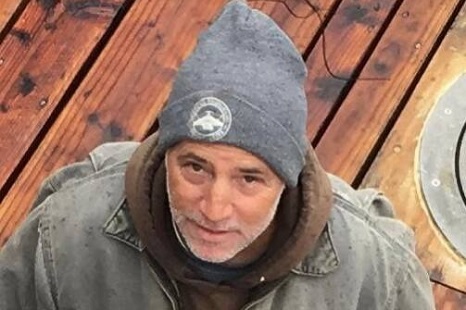
Ben Platt: Whales aren’t at risk from crab fishing along California’s coast
Anyone who lives in or near California’s many historic fishing communities like Morro Bay, Monterey, or Half Moon Bay, has probably heard the term “ropeless” crab fishing gear. That’s the new buzzword for equipment being promoted by environmental groups to solve the perceived problem of whale interactions with fishing gear.,,, Both the East Coast Lobster fishery and the West Coast Dungeness crab fishery, each of which are made up of thousands of independent fishermen, have tested the pop-up “ropeless” gear and found it to be faulty. Meanwhile, strikes by large ships likely cause 50-150 whale deaths a year off the West Coast,,, >click to read< 07:31
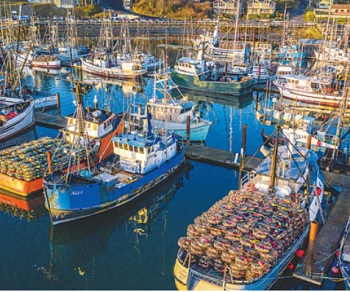
Dungeness Crab Season opens Dec.16th From Cape Falcon to the California border!
Fishing vessels can start setting gear for the pre-soak period as soon as Dec. 13 and see their first pulls hit the docks on opening day. The season is normally scheduled to open Dec. 1, but is often delayed for quality assurance reasons and toxin testing. Testing this year showed a low meat yield in crab specimens, prompting the two-week delay to allow the crabs to fill with meat. Last year’s opening day was delayed until Dec. 31 for similar reasons. Domoic acid levels in crab across the coast were found to be safe for human consumption,,, >click to read< 12:55

WDFW: Toxin domoic acid delays commercial Dungeness crab season until at least Jan. 1
The commercial Dungeness crab season opener faces a delay until at least Jan. 1 due to an excess of the marine toxin domoic acid in the guts of sampled crab, the Tri-State management group announced Tuesday evening, Dec. 8. The season had been previously set to start Dec. 16, depending on whether crab reached required minimum meat standards by then. “This decision was based on domoic acid tests of Dungeness crab collected by WDFW and analyzed by the Washington Department of Health,,, >click to read< 08:31
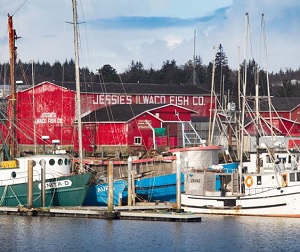
Court OKs deal to keep Jessie’s Ilwaco Fish Co. afloat
San Francisco-based Pucci Foods is positioned to take ownership after a ruling by Judge Goelz on Monday, Dec. 6, in Pacific County Superior Court in South Bend.,, With up to 65 employees depending on the time of year, Jessie’s has been one of the largest employers in Pacific County, according to the Washington State Employment Security Department. It was also Ilwaco’s biggest water customer. With the commercial Dungeness crab season looming, many were concerned about the possibility of losing a primary seafood processor ahead of the lucrative fishery and the impact of having fewer places for fishermen to deliver crab and compete for their business. >click to read< 07:57
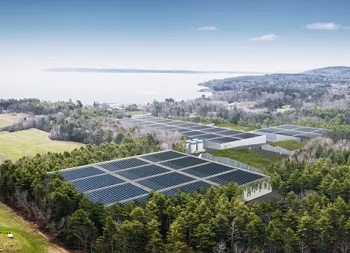
Factory farmed salmon: inland farms offer alternative to diminishing wild stocks, with bigger carbon emissions
One of these land-based salmon farms is planned for Bucksport, Another is intended for Belfast,,, Meanwhile, Nordic Aquafarms, a Scandinavian company with two farms in Denmark, one in Norway and plans for another in northern California, has chosen Belfast for its site. A more ambitious project than that planned for Bucksport, the company hopes to create the second largest such farm in the world. Welcomed by officials for its potential contribution to the town’s economy, there has been opposition from some local people,,, Land based farming using an RAS, recirculating aquaculture system, raises the fish with no exposure to the ocean other than fast flowing, temperature controlled water which is pumped in and out of the fish tanks round the clock. >click to read< 14:15
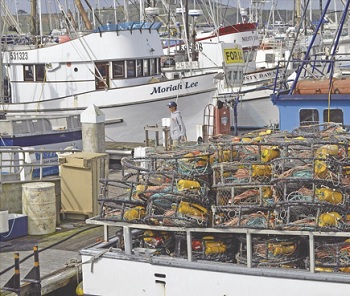
Extended delay – Commercial Dungeness Crab fishing ban extended until Dec. 16
The California Department of Fish and Wildlife extended the delay of commercial crab fishing Nov. 24 from Point Arena down to Mexico after it spotted whales in crab fishing grounds. Scott Edson fishes in Half Moon Bay and isn’t surprised by the delay extension until Dec. 16. He expects the current delay to last even longer. Edson said the delays are a disaster for commercial fishermen trying to survive during a tough season and a pandemic. Increased delays cost him money in an already limited season,,, >click to read< 08:59
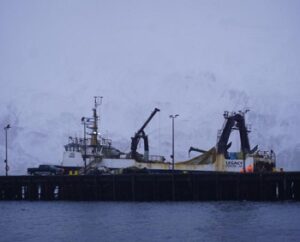
Nearly Entire U.S. Seafoods Trawler Crew Test Positive, Six Fish Processing Plant Employees Test Positive For Coronavirus
Two crewmembers of the trawler F/V Legacy tested positive for the virus on Thursday, according to the City of Unalaska, prompting providers from the local Iliuliuk Family and Health Services clinic to test the rest of the 25-person crew.,,, they showed that 22 more individuals were also positive. All crew members remain on board,,, >click to read<
Six Fish Processing Plant Employees And Two U.S. Seafoods Crewmembers Test Positive – On Friday, the City of Unalaska reported eight new cases of COVID-19 among employees at two local seafood processing plants and crewmembers of a United States Seafoods trawler. Five of the individuals are employed at Alyeska Seafoods and arrived in Unalaska by chartered flight,,, >click to read< 10:40
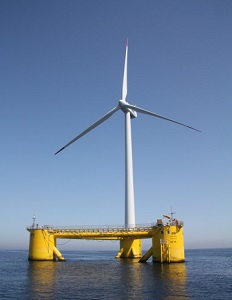
Touting Potential Economic Benefits, Crescent City Harbor District Commissions Offshore Wind Farm Study
Though the Crescent City Harbor District will move forward with a study on the “pluses and minuses” of offshore wind energy production to Del Norte County, the decision wasn’t unanimous. However, their colleagues Carol White and Rick Shepherd, a commercial fisherman, said they were concerned about the environmental impacts those turbines would have on Del Norte County waters. “Plus the last article I read said it cost up to four times more to put these out on the ocean as opposed to putting them on land,” Carol White said. “I’m with Rick I don’t think we should be messing with the ocean at this point, especially when fishermen are struggling to make ends meet.” >click to read< 09:37
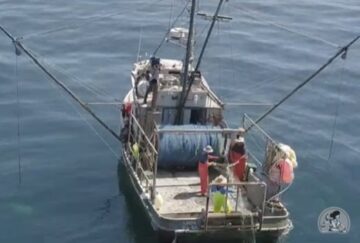
Blue collar fishermen deserve to make a living, not persecution from weak minded politicians and wealthy enviros
Austen Brown started fishing commercially with his father off California’s coast when he was only 8 years old. By the time he was 13, Austen was making his own living as a fisherman, and he has spent the past few decades fishing for everything from codfish to shark. But perhaps his favorite target is the elusive swordfish.,, The swordfish is also a favorite catch for Chris Williams, who has spent more than 40 years plying his commercial fishing trade off the California coast, including targeting swordfish with drift gillnets. Tragically, California’s drift gillnet ban comes at the expense of the fishermen and their families who will be put out of business for no good reason. Video, >click to read< 08:34
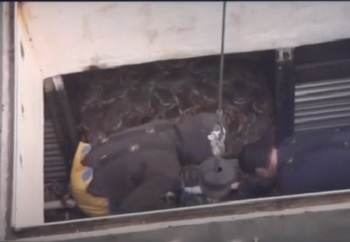
Charleston Fishing Families looks to help prepare for Christmas during tough crabbing year
The Charleston crabbing community in Coos Bay is hit hard yet again, not only with COVID, but with another delay to the start of the season this year. Crab season is delayed to December 16th and there is always the possibility of that changing. That’s why the Charleston Fishing Families organization is stepping up to help their community during the holiday season. “We’re going to provide the Christmas breakfast, dinner, and toys for the kids this year,”,,, The nonprofit is accepting applications for this holiday program. They are looking to help 25 commercial fishing families, and families associated with the industry, like dock workers,, >video, click to read< 17:41
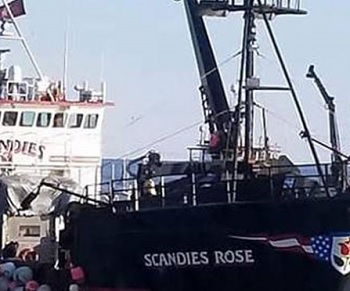
Marine Board of Investigation: Coast Guard looking for details regarding F/V Scandies Rose ahead of public hearing
After almost a year of investigation into the Dec. 31, 2019, sinking of the F/V Scandies Rose that left only two survivors, investigators are still looking for information before a public hearing in February. The Coast Guard’s Marine Board of Investigation will hold a public hearing into the loss of the F/V Scandies Rose from Feb. 22 through March 5. The public hearing will be recorded and livestreamed for those who cannot attend in person. The MBI is looking into why the 130-foot crabber sank near Sutwik Island on New Year’s Eve, which resulted in the deaths of five crew members,,, The MBI also has the testimonies of the two survivors, Dean Gribble Jr. and John Lawler, who were found floating in high seas and freezing temperatures. >click to read< 13:25
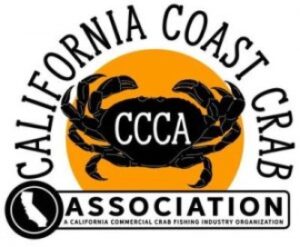
Extended Closure of CA Dungeness Crab Fishing Season Will Hurt Working Families, Eliminate Holiday Crab Traditions
“Since mid-November, fishermen have had to sit idle at the dock and accept delays in the opening of their crab season due to the new, highly restrictive and unfair RAMP rules. “And now the season is being postponed for a full month,” said Ben Platt, president of the California Coast Crab Association (CCCA). Called the Risk Assessment Mitigation Program (RAMP), the new CDFW rules are more restrictive than even the strictest fishery laws in the nation,,, Our fishery is having zero impact on the species,,, “This is a huge success story, and in light of it, the new regulations constitute a solution in the absence of any real problem,” >click to read< 11:29
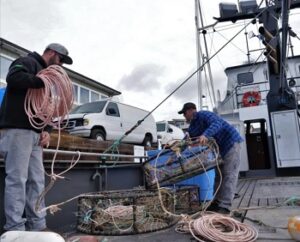
Monterey Bay Fishermen hit with new wave of Dungeness crab season delays
You couldn’t blame crab fishermen Tim and Dan Obert for feeling like they’re passing through the perfect storm. First there was the pandemic, which shut down restaurants and, in turn, much of the demand for Dungeness crab. Then a new regulation took effect on Nov. 1 that heavily restricts the Dungeness fishery’s operations when whales and sea turtles are around. Then the state delayed the opening of the Dungeness crab season until after Thanksgiving. “If you take all three of those things, you will destroy this fishery,” said Tim Obert, 35, of Scotts Valley. “There will be no crabbers left.” >click to read< 08:47

Evermore competition
“We always overestimate the change that will occur in the next two years and underestimate the change that will occur in the next ten.” Microsoft founder Bill Gates. Salmon farming is now well into that next 10, and if you’re an Alaska commercial fishermen or resident of an Alaska community still dependent on commercial fishing, you ought to be worried. Why? Because stories like this have become an almost weekly occurrence: “Norwegian company secures financing for industrial-scale salmon farm in rural Nevada.”, or in (Belfast, Me, Humboldt County, Ca., Maryland’s Eastern Shore,,, >click to read< 14:25
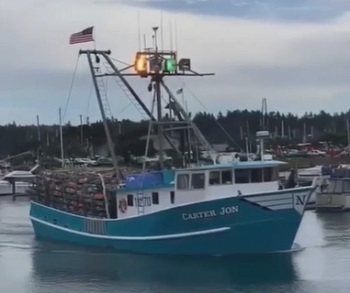
Delay in Dungeness crab season the latest in long string of delayed seasons
The Oregon Dungeness crab season has been delayed two weeks with a start date now set for December 16. It’s the latest in a long string of delayed seasons. The season start date is supposed to be December 1, but for six consecutive seasons it’s been delayed. “It’s a moving goalpost all the time with the Dungeness crab fishery and yeah, I guess were used to waiting here because the state makes the decision when we get to open the season,” says Nick Edwards, owner of F/V Carter Jon. >video, lick to read< 10:36
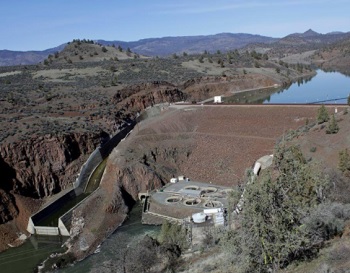
Plan will remove Klamath River dams, reopening the waterway along Oregon-California border
An agreement announced Tuesday paves the way for the largest dam demolition in U.S. history, a project that promises to reopen hundreds of miles of waterway along the Oregon-California border to salmon that are critical to tribes but have dwindled to almost nothing in recent years. If approved, the deal would revive plans to remove four massive hydroelectric dams on the lower Klamath River, creating the foundation for the most ambitious salmon restoration effort in history. >click to read< 12:16
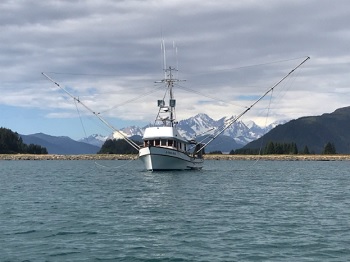
Summer season a mixed bag for Port Townsend fishermen
With the summer season now well astern, many vessels of the Port Townsend fishing fleet have returned to Boat Haven to undergo routine maintenance and repairs. Joel Kawahara stayed in Washington waters for the summer season, aboard his 42-foot salmon troller, Karolee, based out of Quilcene. Jonathan Moore and his family recently returned to Port Townsend along with their 46-foot Little Hoquiam troller, Ocean Belle, following the close of the summer troll season in Alaska. Mike Carr and his 32-foot gillnetter Miss Melito also just hauled out in Port Townsend,,, >click to read< 10:42
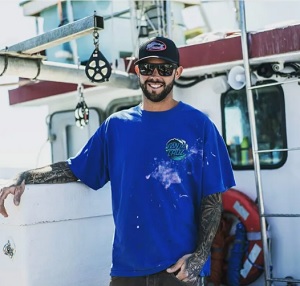
Local Dungeness crab fishermen oppose new fish and wildlife regulations
The regulations are a product of concerns surrounding how often whales and other endangered species are getting caught in the ropes used to fish crabs. The regulations were met with some resistance from the local fishing community. However, conservationists argue the rules will do more good than harm to wildlife. Tim Obert, a fisherman, strongly opposes,,, “You’re driving down the street and you accidentally run over a squirrel or maybe you hit a deer on a mountain road, it doesn’t mean you go park your car in the garage and never turn it on again or never leave your house,” he said. Ben Platt, the President of the California Coast Crab Association, also opposes the regulations,,, >click to read< 08:13
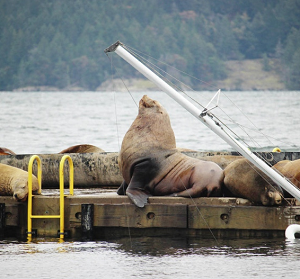
Sea lions throw a party on Cowichan Bay’s federal breakwater to feast on spawning salmon
Steller and California sea lions jostle for space, bark 24-7, and leave stinky feces on the breakwater. About 300 sea lions will climb onto the 182-metre-long concrete dock at one time during at the height of the season, said federal harbour manager Mark Mercer. “They are three layers deep out there.” The majority are males, he said, likening the event to a big bachelor party. Depending on species, males range from about 850 to 2,500 pounds. “Like I tell people: ‘What you see on the breakwater is literally the tip of the iceberg. That’s a tenth of what’s out there.’ >click to read< 12:29
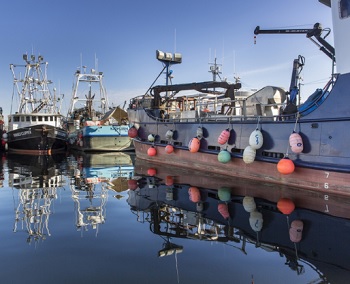
Behind the scenes with Seattle’s crab experts
It’s king crab season in the Bering Sea. That means around 300 people, including many from Fishermen’s Terminal in Seattle, the home port to the North Pacific Fishing Fleet, fly into Dutch Harbor, Alaska, for the harvest. And when king crab season is over, many of these fishermen and women switch to bairdi crab and snow crab. Which means they’ll be busy for four to five months and there will be a lot more crab on the market. As the executive director of Alaska Bering Sea Crabbers, a nonprofit trade association that represents the crab industry, Jamie Goen knows a lot about the work that brings crab from the bottom of the sea to our tables. >click to read< 09:19
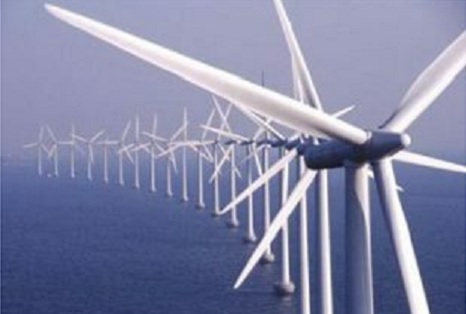
Offshore Wind Industry Cheers Biden Win
Trade groups representing the United States’ offshore wind sector are hailing the election of Joe Biden as the 46th President of the United States as significant to further growing the nation’s offshore wind capacity. Biden’s climate action plan calls for a 100% clean energy economy and net-zero emissions by 2050. This would means a renewed focus on renewable energy, including offshore wind, as the United States is likely to rejoin the Paris Agreement on climate change. Under the Biden Administration, it is expected that offshore wind will experience substantial growth from projects, supply chain development, and job creation, according to The Business Network for Offshore Wind, a non-profit that works to promote the offshore wind supply chain in the U.S. >click to read< 07:51






